- Film And TV
- 21 Mar 23

Attendees at a special event to celebrate the achievements of the Irish film industry included those involved in making the Oscar winning An Irish Goodbye and nominees An Cailín Ciúin and The Banshees of Inisherin - including Best Supporting Actor nominee Brendan Gleeson.
President Michael D. Higgins and Sabina Higgins hosted a St Patrick’s Day Reception at Áras an Uachtaráin on Friday last, celebrating members of the Irish film, audio-visual and performing arts communities. There, on the 30th anniversary of the re-constitution of the Irish Film Bard (now Screen Ireland) the President made a wide-ranging and hugely informative – and inspirational – speech about the progress of the Irish film industry over the intervening years.
Attendees at the event included An Irish Goodbye director Ross White and actor James Martin, winner of the Oscar for Best Live-Action Short Film. Best Supporting Actor nominee Brendan Gleeson, fellow actors Bríd Ní Neachtain, Jon Kenny and Sheila Flitton, and Location Manager Eoin Holohan from multiple Oscar nominated The Banshees of Inisherin were also in attendance, alongside Oscar winning producer David Puttnam.
Best International Feature Film nominee An Cailín Ciúin also had representation at the reception, featuring the movie's director Colm Bairéad, stars Catherine Clinch and Andrew Bennett, Producer Cleona Ní Chrualaoi and Director of Photography Kate McCullough.
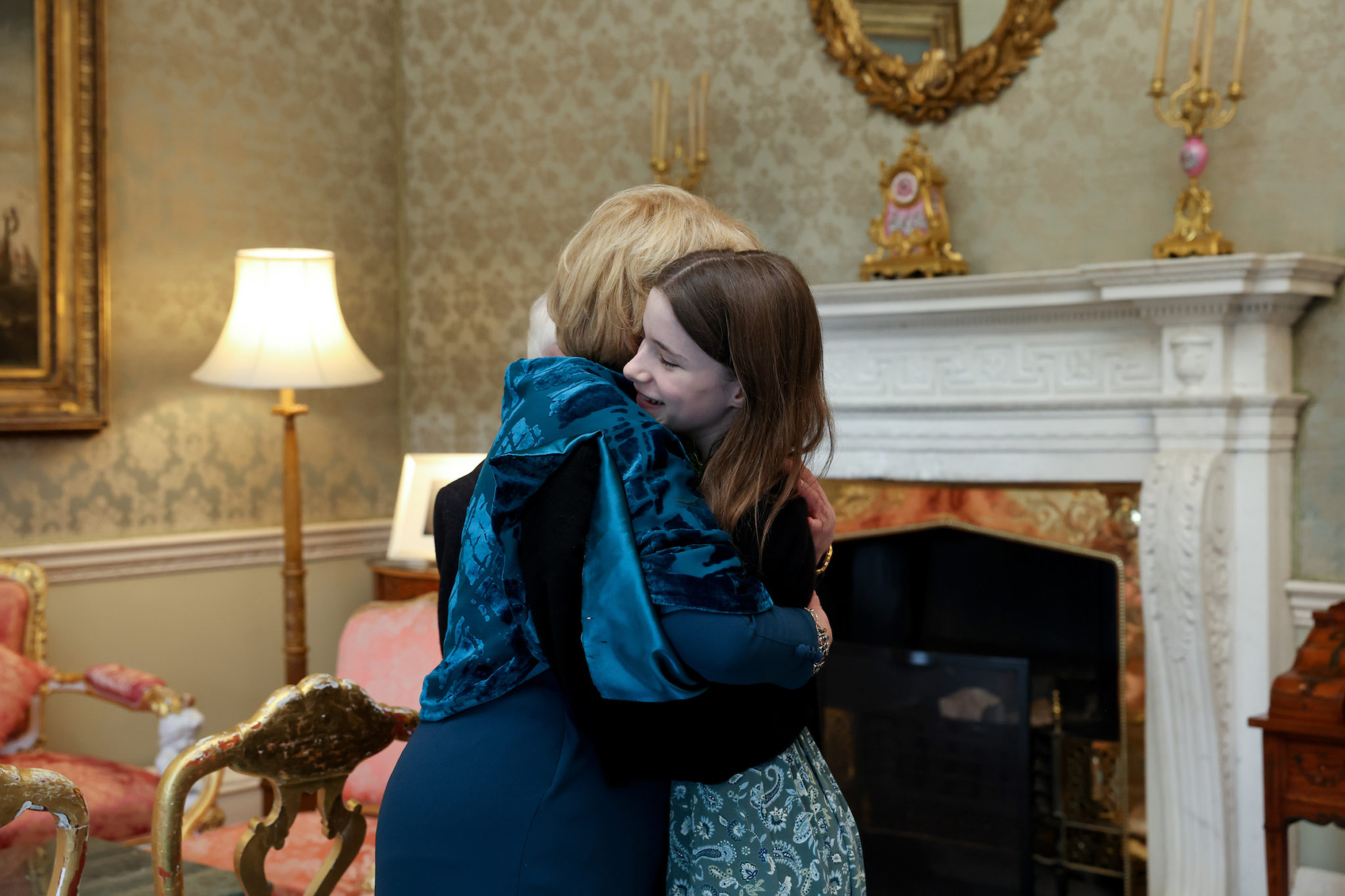 Catherine Clinch and Sabina Higgins. Copyright Maxwell Photography.
Catherine Clinch and Sabina Higgins. Copyright Maxwell Photography.Advertisement
The reception took place following a record 14 Irish nominations at the Academy Awards, which took place last weekend in Los Angeles, to mark the extraordinary progress that has been made in Irish film-making and the important contribution of the film and related industries to Irish life.
This year marks the 30th anniversary of the re-establishment of Bord Scannán na hÉireann / the Irish Film Board, now Screen Ireland, in 1993. Chief Executive Désirée Finnegan, Chair Susan Bergin and members of the Board of Screen Ireland were also present, as well as representatives of the Screen Directors Guild Ireland, the Screen Composers Guild Ireland, Screen Producers Ireland, the Writers Guild of Ireland and the Locations Guild of Ireland.
“As President of Ireland, it gives me great joy and pleasure to witness the attention that is being given to the hard-earned success of our film community, an attention that was generated in a special way by a record 14 Oscar nominations having been secured this year," President Higgins said at the event.
"May I take this opportunity to warmly congratulate the recipients of Oscars at this week’s Academy Awards for their exceptional achievements. I was so moved by the warmth conveyed in An Irish Goodbye. The relationships presented with superb acting, pace and direction had a ring of authenticity."
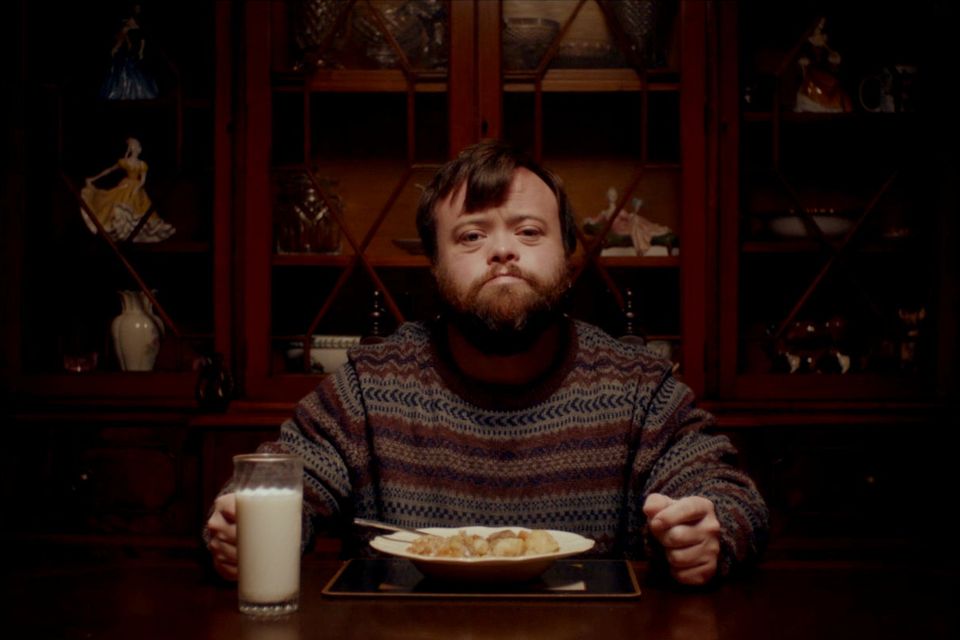 'An Irish Goodbye' star James Martin.
'An Irish Goodbye' star James Martin.President Higgins also commended Richard Baneham, a Tallaght native and animator who worked on Avatar and Avatar: The Way of Water.
Advertisement
"Film production requires the assembling of so many skills. In winning his second Oscar for Best Visual Effects, Richard Baneham draws attention again to the often under-recognised technical achievements that have developed in Irish film-making.
"May I offer sincere congratulations to all of the Irish film community who received so many nominations – Colin Farrell, Paul Mescal, Kerry Condon, Brendan Gleeson, Barry Keoghan and Jonathan Redmond," he continued, before nodding at teh achievements of An Cailín Ciúin, as well as Jessie Buckley and the cast of The Banshees of Inisherin.
"To all involved with An Cailín Ciúin, which made history as a full length feature in Irish, this is of such importance for work in the Irish language. I congratulate The Banshees of Inisherin for the exceptional recognition of their work which receiving so many nominations constitutes. May I also take the opportunity to recognise the performance of Jessie Buckley in Women Talking, winner of Best Adapted Screenplay."
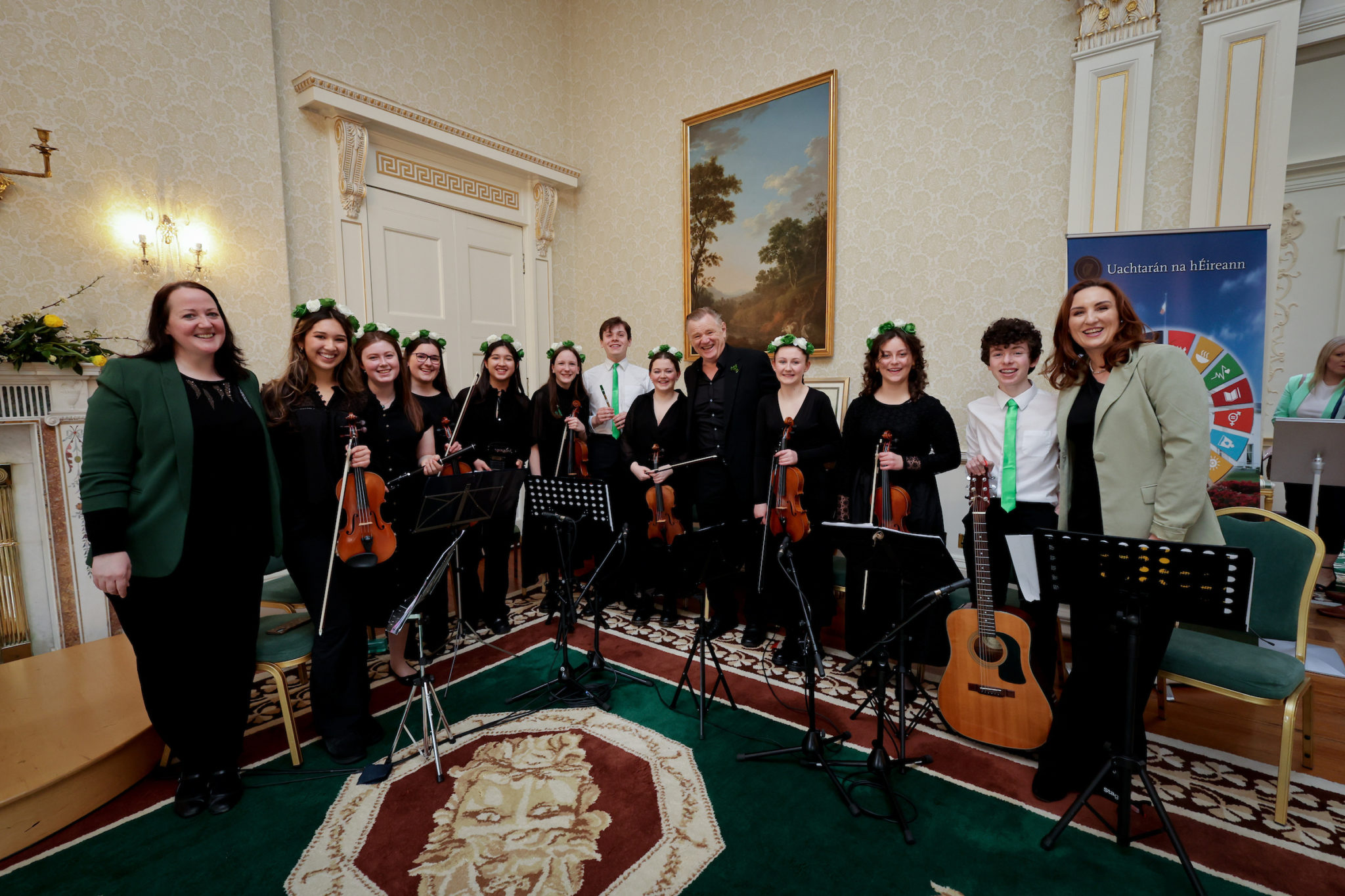 Brendan Gleeson. Copyright Maxwell Photography.
Brendan Gleeson. Copyright Maxwell Photography."This recent success of Irish film may be a surprise to some, but for those working in film it is welcome recognition of what they have been building towards over recent decades with the aid of Government policies and artist support. The present strength of a multi-skilled creative film community on the island of Ireland is the result of committed, loyal supporters of film and decades of work."
President Higgins also encouraged the continuation of the art form as a necessary outlet of expression for our people.
Advertisement
"We must never forget that film or the performing arts are not mere commodities. Film is a powerful and distinct art form, built on the magic of celluloid images, one that expresses the imagination, the memory and the complex circumstances of a people," President Higgins mused.
"In using the many and various artistic mechanisms in innovative and challenging ways, such as script, lighting, direction, music and silence, film has the capacity of addressing the very essence of our being, of our human struggles, our sorrow and our joy.”
Read President Higgins' speech in full below...
"A chairde,
Tá áthas an domhain orm agus ar mo bhean chéile Saidhbhín fáilte a fhearadh rómhaibh uilig go hÁras an Uachtaráin agus muid ag ceiliúradh Lá Fhéile Pádraig agus Lá Náisiúnta na hÉireann.
[Sabina and I are delighted to welcome you all here today to Áras an Uachtaráin as we celebrate Saint Patrick’s Day – the feast day of our patron Saint, Patrick, and our National Day].
Today is an important occasion for Irish people around the world coming together as one global family to celebrate our shared culture, history and heritage. It is a day to reflect on the life of Saint Patrick – himself a migrant like countless other Irish.
Advertisement
Saint Patrick’s Day is a day, too, when Sabina and I welcome here to the Áras individuals and groups of citizens who embody through the craft of their lives, in their own special, unique way, the values and qualities that we invoke from the life of Saint Patrick. Our celebrating together on this significant day seeks to celebrate how those values remain relevant and important in defining our Irishness.
Amongst those values and qualities that we seek to emulate are, of course, solidarity, friendship, which are privileged through creativity and artistic expression – qualities that I know are a driving force in the lives and careers of those who join us here today, the performers, practitioners who represent various elements of our modern film and audio-visual community and our wider performing arts sector. These are communities for which Sabina and I have profound respect, great affection and which has given us so many friends.
May I commence by saying, as President of Ireland, that it gives me great joy and pleasure to witness the attention that is being given to the hard-earned success of our film community, an attention that was generated in a special way by a record 14 Oscar nominations having been secured this year – comhgháirdeas leo.
This recent success of Irish film may be a surprise to some, but for those working in film it is welcome recognition of what they have been building towards over recent decades with the aid of Government policies and committed artists support.
May I straight away take this opportunity to warmly congratulate the recipients of Oscars at this week’s awards for what are exceptional achievements. Having seen it on RTE, but looking forward to seeing it in a cinema, I was so moved by the warmth conveyed in the award-winning live-action short film, An Irish Goodbye. The relationships presented with superb acting, pace and direction had a ring of authenticity. I am delighted that actor James Martin and Director Ross White are with us today.
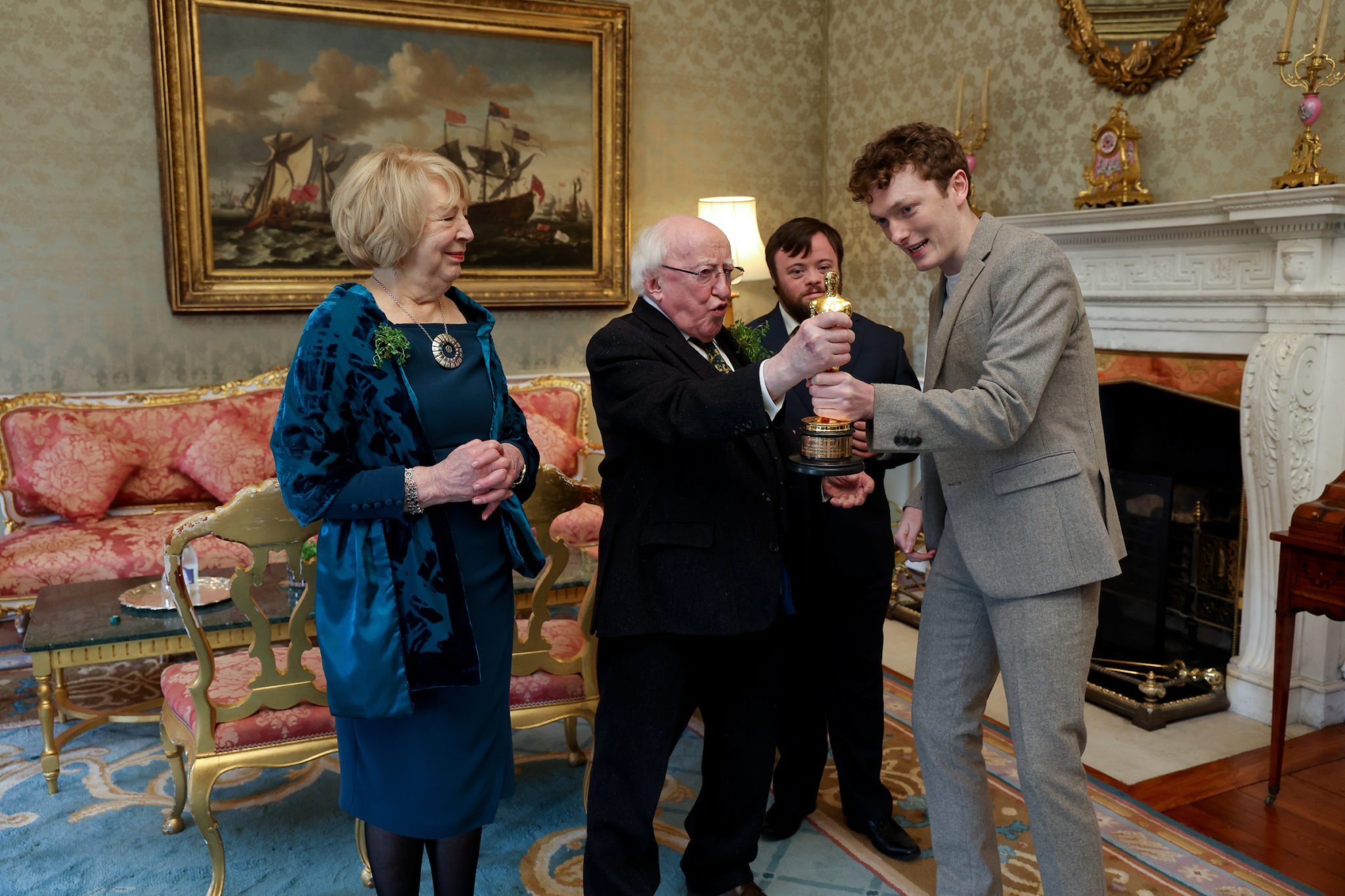 Michael D. Higgins with James Martin and Ross White. Copyright Maxwell Photography.
Michael D. Higgins with James Martin and Ross White. Copyright Maxwell Photography.Advertisement
Film production requires the assembling of so many skills. In winning his second Oscar for Best Visual Effects, Richard Baneham draws attention again to the often under-recognised technical achievements that have developed Irish film-making.
Tréaslaím le Richard, but may I offer sincere congratulations to all of the Irish film community who received so many nominations - Colin Farrell, Paul Mescal, Kerry Condon, Brendan Gleeson, Barry Keoghan, Jonathan Redmond.
To all involved with An Cailín Ciúin which made history as a full length feature in Irish. This is of such importance for work in the Irish language. I congratulate The Banshees of Inisherin for the exceptional recognition of their work which receiving so many nominations for an Academy Award constitutes.
Is mian liom comghairdeas a dhéanamh leis an Stiúirtheoir Colm Bairéad, an Stiúirtheoir Fotagrafaíochta Kate McCullough, agus an t-aisteor Catherine Clinch, atá i láthair inniu san Áras. Tréaslaím libh.
[May I congratulate those involved in An Cailín Ciúin, Director, Colm Bairéad, Director of Photography, Kate McCullough, and actress, Catherine Clinch, all of whom are here today in the Áras.]
I am also delighted that those who were involved in Arracht are here today, the launch of which I attended.
Advertisement
May I also take the opportunity to recognise the performance of Jessie Buckley in Women Talking, winner of Best Adapted Screenplay.
The present strength of a multi-skilled creative film community on the island of Ireland is the result of committed, loyal supporters of film and decades of work. To be any part of that great venture which Irish film constitutes is a great privilege.
This year is the 30th anniversary of the re-establishment of Bord Scannán na hÉireann (Irish Film Board). While the re-funding of the Board was one of a set of decisions that I had the privilege of taking (as Minister for the Arts, Culture and the Gaeltacht) in 1993, I have always believed that removing funding of the Irish Film Board in 1987 was a mistake.
Irish film-makers had continued to achieve considerable international success, including the Oscar-nominated films My Left Foot, The Crying Game, The Field and the box office success The Commitments, which were all produced with non-Irish finance.
Film, and its promise in terms of artistic achievement as an industry, was kept alive by believers. The success of the projects I have mentioned, together with intensive and most creative lobbying by members of the film community, such as Lelia Doolan and the late Tiernan MacBride and others, and most importantly an invaluable report, the 1992 ‘Report of the Working Group on Irish Film’, were what made possible my being able to convince the Cabinet of the day of the case for the re-funding of the Irish Film Board.
I am delighted that Chris O’Grady, who was responsible for that first-class evaluation of the potential of Irish film, as part of his work for the Group, is here with us today.
Re-funding An Bord Scannán was just one of a set of steps which I had the privilege of proposing, back in 1993, to develop and promote Irish film and independent television production. Other steps, and they would be amplified over the years, would go on to include independent commissioning by Teilifís na Gaeilge, now TG4, investment and training by Údarás na Gaeltachta and ANCO, and the introduction of tax-based incentives for film investment, especially those to foster independent productions.
Advertisement

Following the re-establishment of An Bord Scannán, film quickly became a highly valued activity on a cultural as well as economic level by a brilliant, enthusiastic, inter-generational set of film practitioners.
In what was a small group in a new Department, Kevin O’Driscoll, who is with us, and the late Colm Ó Briain, gave limitless support in what was happening at breakneck speed and at several levels.
That was three decades ago. However, there is a rich history associated with Irish film, as archives such as that of Kevin and Emer Rockett’s work shows. That heritage has grown richer and, above all, being stretched and developed by new generations of a creative and talented film community innovating, using and responding to developments in technology. It is a community that was sustained heroically and is being pushed ever forward creatively.
More and more Irish films, including animated films, are receiving recognition and critical acclaim abroad. That Ireland is now correctly regarded as an important hub for film-making, including post-production activities, is a real achievement by all those in the different generations who have worked to bring it about.
Developing the full range of skills involved for successful bidding for film production was a challenge that was recognised from the beginning and benefitted from advice offered by those, such as David Puttnam, who loves both film and Ireland, and who I am delighted is with us today, accompanied by his wife Patsy.
Analysing and assessing the future continues. May I take this opportunity to congratulate Desiree Finnegan, CEO of Screen Ireland, and her colleagues present today, for having the prescience to commission a new study, The Skills Challenge for the Screen Sector in Ireland 2023. I urge all those interested in the future growth of our screen industries to take action on its key recommendations which relate to crucial issues such as skills gaps, the gender gap, removal of silos and a better integration across higher education.
Advertisement
Variety magazine tell us that, “Ireland has become a capital of filmmaking in recent years, [establishing itself as] one of the world’s most attractive production environments”. This is due in no small part to the creativity and talent of writers, directors, producers, casts and crew that Ireland now has to offer.
However, this is a community, we must never forget, that while it rightly celebrates on occasion, it more usually experiences the fruits of precariousness and uncertainty. Poverty, insecurity in ones later years, should not be a characteristic of a life spent working in film and the performing arts.
One of the most crucial aspects of the Irish film and audio-visual industry, and indeed the wider performing arts, is its wealth of creative talent.
Central to the role of An Bord Scannán has been the identification, development and support of emerging Irish talent, often through short and low-budget films. This co-operation between Screen Ireland, TG4 and the Broadcasting Authority of Ireland has been such an exemplary initiative.
It is of such importance that the foundational and continuing role of State initiatives and support for the Irish film industry is given appropriate recognition, and is continued not just in relation to investment incentives but in relation to training and creative interaction of State bodies.
There are many who have been great friends of Irish film, and some we have lost too early in their work. May I take this opportunity to pay my respects to the family and friends of James Flynn, who died last month, and whose passing represents the loss of one of the key figures in modern Irish film production.
Advertisement
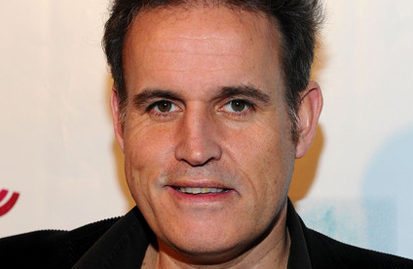 James Flynn. Credit: Getty Images.
James Flynn. Credit: Getty Images.Over the course of his career, James Flynn made a remarkable contribution to the Irish film industry, both in terms of fostering the development of films by the Irish film community itself, and in bringing so many international projects to this island. James’s death at such a young age is an immeasurable loss to the industry and to all of us who knew him.
There are several reasons why all of the performing arts remain essential to contemporary society. The performing arts are a source of learning, life-enhancing, emancipatory, valuable critiquing our history and revealing to us in so many ways the depths of ourselves, expressed and repressed, the fragility of life and the human condition, and our connection with the world we inhabit.
The success of Ireland’s film, audio-visual and performing arts sector lies on the talent found across the island, but also on our ability to utilise successfully, but with respect, our natural resources, namely our beautiful landscapes and vast array of period architecture.
Such gifts of location are now amplified by the existence of a full compendium of skills acquired from opportunities taken and State supported, and through the establishment of world-class studio facilities such as Ardmore Studios and others.
Expenditure on assisting film production makes good economic sense. The Film, TV and Animation sector in Ireland is estimated to be worth over €692 million, comprising 11,960 jobs by way of direct, indirect and induced employment across the economy. There is a strong economic return to investment in the sector, as has been borne out by countless analyses.
Advertisement
However, we must never forget that film or the performing arts are not mere commodities. Film is a powerful and distinct art form, built on the magic of celluloid images, one that expresses the imagination, the memory and the complex present circumstances of a people.
In using the many and various artistic mechanisms in innovative and challenging ways, such as script, lighting, direction, music and silence, film has the capacity of addressing and conveying the very essence of our being, of our human struggles, our sorrow and our joy.
The late Alf MacLochlainn was among the first to write of the distinctiveness of film as an art form. Film-making, as an independent art form, may draw from and build on skills and forms of practice that are present in the other arts but is never reducible to them. Film production in Ireland shows us how it plays an important role in documenting social history, is an essential and provocative part of Irish historiography itself, and the motifs explored in its dramatic works tell us so much about the culture in which such works were created.
The performing arts provide a conduit to experiencing different perspectives that we may not be aware of or have even contemplated, their capacity to examine dialogue, monologue, lyric, sound and character allows us empathise, fosters compassion, enables us to anticipate the joy and grief of resonating with each other. Participating in the performing arts, whether it be drama, ballet, opera, music or comedy, helps us understand, and even more importantly, experiment with what it means to be human.
A truly great piece of art can transform the way we view the world, alter the manner in which we understand our human struggles and create links between past experiences, present realities, and utopian futures. Many of the greatest artworks are those which have the courage to take risks, to explore new themes or to rework traditional themes from new and creative perspectives.
They are pieces which experiment and innovate, perhaps with language, style and characterisation, to make exceptional works which truly push the state of the art. That is what you all have been at, ensuring that the arts remain constantly relevant, challenging and thought-provoking. Film is a crucial player in all of such performative practice and possibilities.
May I thank you all for your contribution to the Irish film, audio-visual and performing arts sector, your contribution to the hard-won great standing which it has attained, the future you make possible, all of which is built on decades of dedication, creativity and hard work. All of your work is something to be celebrated.
Advertisement
Finally, may I thank all those who have made today such a special experience and enabled us to once more have such a celebratory occasion in Áras an Uachtaráin on our national Saint’s Day.
I thank all the musicians – Kitty Sabry, Simon Carey, Aisling Martin, Róisín Martin, Orla Nic Fheorais, Éabha Foy, Anna Quin, Miriam Quin, Valeska Thiersch and Joe O Gallachoir – for the beautiful music performed today.
I thank our first-aiders and the staff here at the Áras who have all worked so hard to make today a success.
Mo bhuíochas libh uilig. Beannachtaí na Féile Pádraig oraibh."









